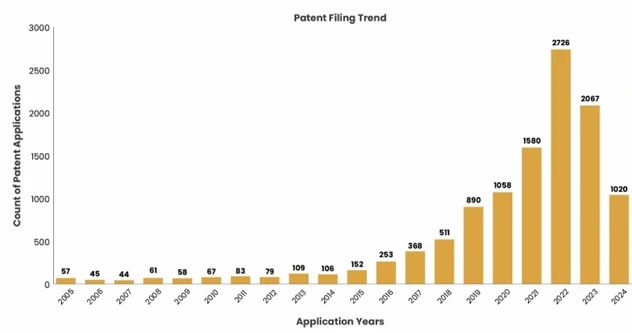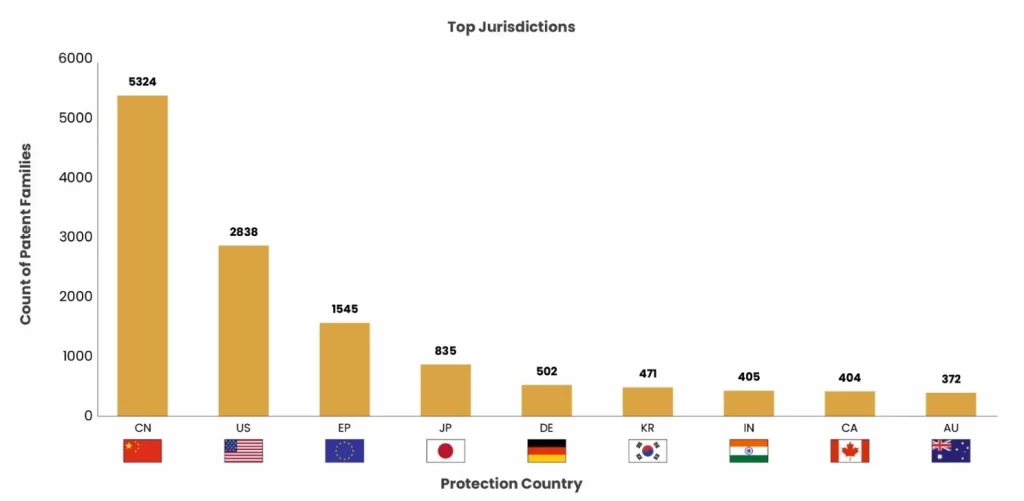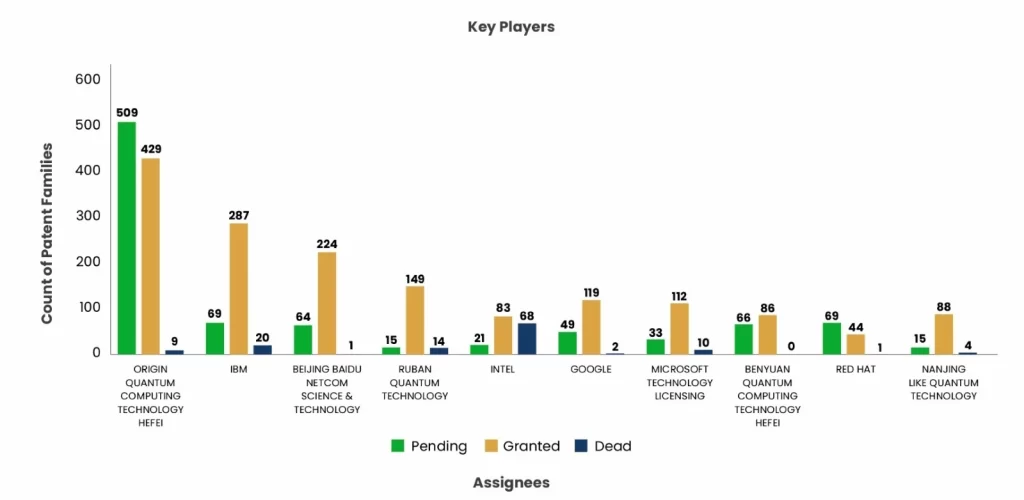A Glimpse into the Future of Quantum Computing: Market and Patent Trends
By- shudhant, shilpi saxena
Editors - mitthatmeer kaur
Quantum computing represents a paradigm shift in computational science, using the principles of quantum theory to solve problems that are beyond the capabilities of classical computers. As technology evolves, the future of quantum computing promises even greater advancements, unlocking new possibilities across industries. Unlike traditional computing, which relies on bits that are either 0 or 1, quantum computing uses quantum bits, or qubits. Qubits harness the unique phenomenon of superposition, allowing them to exist in multiple states simultaneously, enabling quantum computers to perform parallel computations at an unprecedented scale.
Additionally, quantum entanglement, another powerful aspect of quantum mechanics, links qubits in such a way that they remain connected, no matter the physical distance between them. This interconnection creates a sophisticated network of quantum states, allowing quantum computers to process information in ways classical computers cannot match.
With these two phenomena—superposition and entanglement—quantum computers have the potential to solve complex problems much more efficiently, particularly in fields like cryptography, optimization, and molecular simulations.
Table of Contents
The Journey of Quantum Computing: From Theory to Reality
Quantum computing has evolved from theoretical concepts to transformative technology. In the 1980s, pioneers like Richard Feynman and David Deutsch laid the groundwork—Feynman proposed that quantum systems are best simulated by quantum computers, while Deutsch introduced the idea of a universal quantum computer. These insights highlighted the necessity of quantum computing for solving specific computational challenges. By the 1990s, theoretical ideas began to take shape through experimental work, including the development of quantum algorithms and error correction techniques. The early 21st century saw the first functional quantum computers, paving the way for rapid advancements.
The field gained further momentum as tech giants entered the race. IBM’s introduction of cloud-accessible quantum computers in 2016 democratized the technology, and Google’s demonstration of quantum supremacy with the Sycamore processor in 2019 showcased its potential to outperform classical computers in specific tasks.
Quantum Innovation Reflected in Patent Trends
Over the past decade, the quantum computing patent landscape has experienced dramatic growth. After a period of modest activity in the early 2000s, patent filings surged around 2013, increasing by approximately 50% year-over-year—effectively doubling every 1.4 years. This rapid acceleration highlights the increasing interest in the field. From 2005 to 2017, patent filings grew steadily, reflecting both gradual adoption and innovation in quantum technologies. However, between 2018 and 2022, the pace accelerated, signaling heightened interest and advancements in emerging technologies.

Figure 1 – Exponential Rise of Quantum Computing Patent Applications over Years
Note: Patent applications filed between 2023 and 2025 may not yet be fully published due to the 18-month publication timeline. As a result, the data may show a temporary downward trend in patent filings for this period.
Recent Advancements and Emerging Technologies in Quantum Computing
The field of quantum computing has seen remarkable progress, particularly in quantum error correction, algorithms, and hardware development.
Quantum Algorithms
The development of quantum algorithms has seen a surge in patents, particularly in areas like quantum cryptography, simulation, and optimization. These algorithms capitalize on the unique properties of quantum computing to tackle problems that are infeasible for classical methods. Notable advancements, such as in quantum machine learning, are unlocking new possibilities in data analysis, pattern recognition, and predictive modeling.
Quantum Hardware
Significant progress in qubit design, quantum processors, and communication devices is paving the way for more powerful and reliable quantum systems. Innovations in superconducting qubits, trapped ions, and topological qubits are improving stability, coherence times, and scalability. These breakthroughs are not just incremental but transformative, bringing us closer to unlocking the full potential of quantum computing.
Quantum Software
Software advancements are equally critical, with patents in quantum programming languages, development tools, and error-correction software enabling practical applications. These innovations are essential for bridging the gap between theoretical quantum capabilities and real-world implementation, making the technology accessible across diverse industries.
This dynamic landscape reflects an era of rapid evolution, with continuous advancements accelerating quantum computing’s journey from the research labs to real-world applications.
The Global Spread of Quantum Computing Patents
The geographical spread of quantum computing patents reveals significant activity in China, United States, Europe, and Japan. Figure 2 illustrates the distribution of quantum computing patents across multiple jurisdictions worldwide.

Figure 2 – Geographical Distribution of Quantum Computing Patents
This international reach underscores the global recognition of quantum computing’s transformative potential and the race among nations to lead in this cutting-edge technology. The ongoing rise in patent filings as the field evolves is expected to drive further innovation and collaboration. This will, in turn, accelerate the development and commercialization of quantum technologies.
Influential Patent Holders and Their Role in Shaping the Field
The quantum computing patent landscape is shaped by leading companies and research institutions making groundbreaking contributions. Figure 3 highlights the key players dominating patent filings in this rapidly evolving domain.

Figure 3 – Top Innovators Shaping the Future of Quantum Computing
Origin Quantum Computing
Origin Quantum Computing has become a key player in quantum algorithms and hardware innovations, with numerous patents advancing the field. Recently, Bengbu Medical University and Origin Quantum announced the establishment of the Hefei Institute of Quantum Computing and Data Medicine, China’s first institute focused on the intersection of quantum computing and data medicine. The collaboration focuses on enhancing medical capabilities through the integration of quantum computing with medical data. At the same time, it is also exploring new methods for talent development and medical applications. This exploration is accelerating progress in healthcare and digital development in China.
IBM
IBM is aiming to build the largest quantum computer to date by connecting smaller machines to create one with an unprecedented number of quantum bits, or qubits. By 2025, the company expects to break its qubit record. It plans to eventually more than triple the size of the current largest quantum computer. In just six years since unveiling its first commercial quantum computer with 20 qubits—the fundamental building blocks of quantum computing—IBM has become a pioneer in the field. The company holds an extensive patent portfolio and has made significant strides in superconducting qubits. Additionally, it developed the IBM Quantum Experience, which allows cloud-based access to quantum computers.
Google recently introduced its latest quantum processor, Willow, marking a significant advancement in the field. Willow can solve complex calculations in under five minutes—an accomplishment that would take a classical supercomputer ten septillion years—demonstrating the vast potential of quantum computing. It also addresses one of the key challenges in the field: error rates. This follows Google’s 2019 quantum supremacy achievement with the Sycamore processor, reinforcing its leadership in quantum hardware and algorithms.
These entities are not only advancing technology but also shaping the future of quantum computing and its competitive landscape through their robust patent portfolios.
Outlier: Baidu entered quantum computing in 2018, aiming to become a global leader in five years by focusing on quantum AI, algorithms, and architecture. It unveiled a 10-qubit quantum computer in 2022 and later developed a 36-qubit chip, alongside software-hardware interfaces, a quantum operating system, and a cloud-based quantum machine-learning platform. In March 2023, Baidu and BAQIS launched China’s first quantum computing IP alliance to foster innovation. However, in 2024, Baidu decided to give up its quantum computing division. The company donated its entire research facility to the government-run Beijing Academy of Quantum Information Sciences (BAQIS).
Annual Filing Patterns of Leading Quantum Computing Innovators
Every year, a surge of patent applications highlights the relentless pace of innovation in quantum computing. The peak filing years of 2021 and 2022 align with a period of heightened technological advancement, with widespread activity across a diverse range of companies. This surge underscores the global focus on research and development, while the recent decline might point to consolidation or a temporary slowdown in the innovation cycle.

Figure 4 – Annual Filing Patterns of Leading Quantum Computing Innovators
Leading this charge are tech giants like IBM, Intel, Google, and Microsoft, each filing numerous patents that reflect their commitment to advancing quantum technologies. Simultaneously, emerging companies like IonQ and Huawei are making notable progress. They are further strengthening the global movement toward next-generation computing solutions. Notably, Chinese companies are also making their mark, underscoring China’s substantial investment in quantum research and development. Corporate powerhouses, academic institutions like Tsinghua University, and financial institutions like Bank of America are all actively engaged. Their combined efforts across academia, industry, and finance are shaping the future of quantum computing.
Overall, patent filings showed consistent growth over the years, followed by a notable surge that reflects accelerated innovation. This momentum is driven by a diverse mix of contributors across sectors, particularly in China, underscoring the global focus on advanced technologies.
Quantum Computing Applications: Transforming Industries
Quantum computing is driving transformative changes across multiple sectors through its extraordinary computational capabilities.
The Cryptographic Revolution in Quantum Computing
The advent of quantum computing brings a dual impact to the field of cryptography. Current encryption methods, particularly RSA, face significant vulnerability as quantum computers can efficiently factor large integers using Shor’s algorithm. However, this same computational power enables the development of quantum-resistant encryption techniques and unbreakable codes. Through quantum key distribution, it marks a new era in secure communication protocols.
Optimization: Breaking Computational Barriers
Quantum computing excels at solving complex optimization problems that overwhelm classical computers. With the help of techniques like quantum annealing and the Quantum Approximate Optimization Algorithm (QAOA), industries are now able to address combinatorial optimization challenges. These solutions offer efficiency never seen before. This capability spans finance, logistics, and manufacturing, enabling solutions to previously intractable problems.
Material Science and Molecular Simulation
The quantum computer’s ability to simulate molecular structures and interactions at the quantum level represents a breakthrough in material science. As a result, this capability allows for precise modeling of chemical reactions and accelerates the discovery of new materials. The implications range from drug discovery to the creation of novel materials with unique properties. Ultimately, this is fundamentally altering our approach to material research and development.
Financial Services in the Quantum Era
In the financial sector, quantum computing transforms complex financial modeling and risk assessment. By efficiently solving optimization problems that classical computers struggle with—such as portfolio optimization and risk management—quantum computers not only enable more accurate predictions but also facilitate informed decision-making. Moreover, this computational power processes multiple variables simultaneously, paving the way for more sophisticated financial strategies.
Healthcare and Drug Discovery Transformation
Quantum computing revolutionizes healthcare by enhancing drug discovery capabilities. By simulating molecular interactions at unprecedented scales and speeds, researchers can identify promising drug candidates more efficiently. Consequently, this acceleration in the development of new treatments and personalized medicine approaches holds the potential to transform patient care and improve treatment outcomes.
Logistics and Supply Chain Optimization
The impact of quantum computing on logistics manifests through optimized supply chain management. By solving complex routing and scheduling problems, organizations can achieve more efficient operations and reduced costs. The ability to process vast amounts of data while considering numerous variables simultaneously leads to optimal solutions that were previously unattainable, enhancing overall operational efficiency.
The Power of Quantum Computing: Key Benefits
- Quantum Supremacy: This was achieved by Google’s Sycamore processor in 2019, completing a 200-second computation that would take classical supercomputers ~10,000 years.
- Faster Problem-Solving: Utilizes superposition and entanglement to solve complex problems efficiently, including optimization and large-scale simulations.
- Enhanced Data Security: Quantum encryption methods, like quantum key distribution, create highly secure communication channels.
What Future Holds
The future trajectory of quantum computing is poised for significant advancements, driven by ongoing research and development. A key focus area is the improvement of qubits, the fundamental units of quantum information. Specifically, researchers are working on error-corrected logical qubits, which are crucial for building scalable and reliable quantum computers. This shift—moving from simply increasing the number of qubits to enhancing their quality—is expected to address the critical challenge of error correction. Consequently, this will pave the way for quantum computers to become more practical for real-world applications.
Additionally, advancements in quantum hardware, such as the development of modular quantum computers, are anticipated. These systems, composed of interconnected quantum processors, will enable more complex computations and facilitate the scaling up of quantum technologies. As these technological improvements continue, we can expect quantum computing to transition from experimental setups to more robust and commercially viable systems.
The Expanding Horizons of Quantum Computing Applications
As quantum computing continues to mature, its transformative potential is poised to revolutionize industries on a global scale:
- Artificial Intelligence (AI): Quantum computing can supercharge advanced AI by optimizing machine learning algorithms, enabling faster data analysis, and delivering unprecedented predictive accuracy. Furthermore, this advancement holds the potential to revolutionize natural language processing, image recognition, and autonomous systems.
- Climate Modeling: By simulating intricate climate systems with unparalleled precision, quantum computers can offer deeper insights into climate change. These simulations can inform the development of effective mitigation strategies, contributing to global sustainability efforts.
- Pharmaceuticals: By accurately modeling molecular interactions, quantum computing has the potential to accelerate drug discovery. Hence, this could lead to a substantial reduction in the time and cost of developing new treatments and medications.
- Materials Science: Technology can assist in creating innovative materials with customized properties. These advancements will lead to breakthroughs in energy storage, advanced electronics, and cutting-edge manufacturing processes.
Quantum computing is unlocking new possibilities across diverse fields, poised to redefine the boundaries of innovation. As it continues to transform industries and tackle complex challenges, the future of quantum computing promises even greater advancements, further shaping industries in profound and transformative ways.
Final Thoughts
Quantum computing stands at the forefront of a technological revolution, with its ability to reshape industries. It promises to solve complex problems that classical computers cannot handle. From its theoretical origins to its rapid advancements in algorithms, hardware, and software, quantum computing is transforming the landscape. As it continues to evolve, it is poised to unlock new realms of possibility. Furthermore, the increasing number of patent filings highlights the accelerating momentum in research and development, as leading companies and institutions strive to secure intellectual property and push the boundaries of innovation.
With ongoing advancements in quantum error correction, hardware scalability, and algorithm development, quantum computing is steadily transitioning from experimental concepts to practical, commercially viable solutions. Consequently, the future of quantum computing promises even greater breakthroughs, and its transformative impact on global industries is expected to be profound. As we approach this exciting frontier, continued collaboration between researchers, developers, and industry leaders will be crucial to unlocking the full potential of this groundbreaking technology.
Stay Ahead with Expert IP Strategy
Stay ahead of the curve in this fast-evolving sector, where companies are constantly innovating, driving breakthroughs, and steering the future of quantum computing. At Sagacious IP, we provide comprehensive patent landscape analysis to help you identify emerging opportunities and safeguard your innovations. As quantum computing continues to revolutionize industries, our expertise ensures you remain competitive, well-informed, and strategically positioned. Contact us today, to discover how we can help you lead in the quantum era.
– Shudhant Khurana, Shilpi Saxena (ICT Licensing) & Mitthatmeer Kaur (Content Creation & Strategy)
Having Queries? Contact Us Now!
"*" indicates required fields




